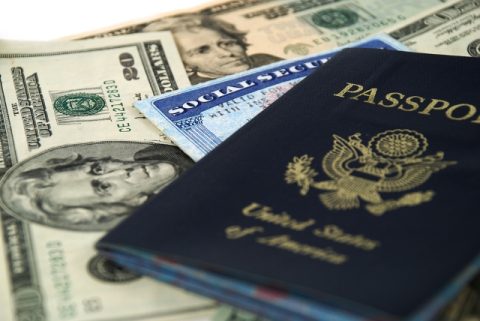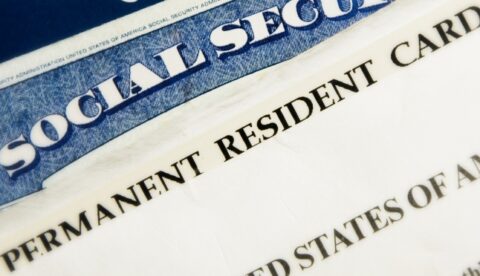Immigration 101
How the United States Immigration System Works
- How the Immigration System Works
- June 24, 2024
U.S. immigration law is very complex, and there is much confusion as to how it works. This fact sheet provides basic information…
Read More
Birthright Citizenship in the United States
- Birthright Citizenship
- October 16, 2024
This fact sheet explains birthright citizenship, the Fourteenth Amendment, and its interpretations. Who is…
Read More
Asylum in the United States
- Asylum
- August 27, 2014
Asylum seekers must navigate a difficult and complex process that can involve multiple government…
Read More
Congressional Hearing Illustrates Nativist Manipulation of “Border Security”
The concept of “border security” is inherently ambiguous. After all, we live in a world where no international border can be completely sealed. The risk that a bad guy will come across the border—by land, sea, or air—can never be reduced to zero, no matter how much money or manpower is funneled into border-security operations. As a result, it is easy for political opportunists to use the notion of “border security” as a smoke screen behind which to advance their own agendas. In the context of the debate over immigration reform, the quest for ever-increasing levels of border security is used as an excuse to oppose any meaningful changes to a dysfunctional immigration system which itself undermines security by its failure to operate fairly or efficiently. This is an irony which is apparently lost on those nativist politicians and activists for whom no level of border enforcement will ever be viewed as sufficient to justify immigration reform. Read More

How Budget Cuts From Sequestration Will Affect The Nation’s Immigration System
The U.S.’s immigration system, already burdened by application processing backlogs and insufficient funding for immigration courts, could become even more unwieldy if the government must slash its budget on March 1. Sequestration – a package of across-the-board government spending cuts totaling $85 billion this year and $1.2 trillion over the next decade – likely will go into effect on Friday unless Congress and President Obama manage to reach a deal. Currently, there are no reports of ongoing negotiations to avert the automatic cuts, so when the cuts kick in, all aspects of the immigration system – from visas to deportations – would be impacted. Read More

SCOTUS Narrows Protections For Noncitizens Who Received Poor Legal Advice
Almost three years ago, in the landmark decision Padilla v. Kentucky, the Supreme Court acknowledged the severity of deportation and that our current immigration laws make “removal nearly an automatic result” for many noncitizens convicted of crimes. Consequently, the Court held that a criminal defense attorney must advise noncitizen clients about the risks of deportation if they accept a plea bargain. If the defense attorney fails to provide this advice, the noncitizen can seek to have the conviction set aside. Such recourse brings integrity to the criminal justice and immigration systems and ensures that immigrants who reasonably rely on advice from their lawyers are not unfairly held accountable for their lawyers’ mistakes. Read More

Survey: Asian Americans Concerned with Legalization, Family Backlogs
In the current debate, immigration is often depicted as a Latino issue. This is partially because just over half of America’s foreign-born population is from Latin America and the Caribbean, and the current political climate around immigration is largely seen as being driven by Latino turnout for Democrats in the 2012 election. But this depiction glosses over the millions of immigrants – documented and undocumented – who hail from other parts of the globe. Read More

Nativists Fail to Grasp Economics of Immigration Reform
This week, the New York Times gave voice to the nativist argument that legalizing unauthorized immigrants would drain the federal budget because newly legalized immigrants will start using public benefits. However, this flawed fiscal accounting overlooks the myriad ways in which immigrants, just like the native-born, contribute to the U.S. economy over the course of their adult lives. As workers, they add value to the economy through their labor. As taxpayers, they fund government services and programs at the federal, state, and local levels. As consumers, immigrants purchase goods and services from U.S. companies, big and small, sustaining U.S. jobs in the process. And, as entrepreneurs, many immigrants create jobs through the businesses they establish. In other words, the economic contributions of any person, immigrant or native-born, come in many forms and span a lifetime. Read More

Politicians Invent Doomsday Predictions About Immigration Reform
Nativists are rarely encumbered by facts. By its very nature, nativist rhetoric is based on stereotype and mythology, not empirical evidence. Regrettably, some of our elected leaders in the House of Representatives and the Senate have embraced the mirage of nativism as they embark on a crusade to derail any meaningful reform of the U.S. immigration system. More precisely, anti-reform politicians have been issuing doomsday predictions about what will happen to the nation if a legalization program is created for unauthorized immigrants already living in the United States. It comes as little surprise that these predictions have no basis in reality. Read More

Why Should We Support a Legalization Program for Unauthorized Immigrants?
As the immigration debate heats up in Congress, the central question for much of the American public will be whether or not to create a pathway to legal status for the 11 million unauthorized immigrants now living in the United States. In formulating an answer to that question, however, it is necessary to ask two others. First, exactly who are the unauthorized immigrants who would be attaining legal status? Secondly, what would the impact be on the U.S. economy were so many unauthorized immigrants to be legalized? The answer to the first question is relatively simple: unauthorized immigrants are just like everybody else; they are adults and children, mothers and fathers, homeowners and churchgoers. The short answer to the second question is that legalization would be a stimulus to the U.S. economy. Workers with legal status earn higher wages, and these extra earnings generate more tax revenue for federal, state, and local governments, as well as more consumer spending, which sustains more jobs in U.S. businesses. Read More

Getting to a Citizenship Consensus
Immigration reform is enjoying a resurgence of support in both parties, with groups from a variety of backgrounds coming out in favor of a range of changes to our current system. The most striking change may be the melting of opposition to a pathway to citizenship for the 11 million undocumented immigrants in the U.S. But acceding to citizenship and creating a system that will actually allow people to get there are two different things. Read More

A Clash of Conservatives in Kansas
Anti-tax crusader Grover Norquist came to Topeka this week to serve as a counterweight to Kansas Secretary of State Kris Kobach in the national debate over immigration reform. Norquist, the president of Americans for Tax Reform, is best known for persuading congressional Republicans to sign his anti-tax pledge. However, he is also an opponent of restrictive and punitive immigration policies. Kobach, on the other hand, has used his perch as Kansas Secretary of State to travel the country touting the evils of unauthorized immigration and drafting various and sundry state laws that crack down on anyone who looks like an unauthorized immigrant. Read More

Immigrants Add Billions to the Arkansas Economy
A perennial question in the immigration debate is whether or not immigrants contribute more to the economy than they cost. That is, do they add more economically as workers, taxpayers, consumers, and entrepreneurs than they “consume” in public education, public healthcare, and public benefits? In some ways, this question is misleading. Education and healthcare are social investments that pay future dividends; they are not merely fiscal expenses. Nevertheless, it is a useful exercise to take the question at face value and do the math. The result, contrary to the convoluted arithmetic of anti-immigrant activists, is overwhelmingly positive. Immigrants add far more to the economy than they take away. And given the aging of the native-born population, the contributions of immigrants (and their children) will only increase over time. Read More
Make a contribution
Make a direct impact on the lives of immigrants.

